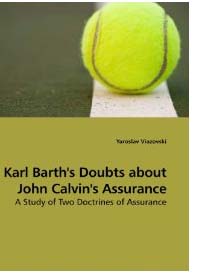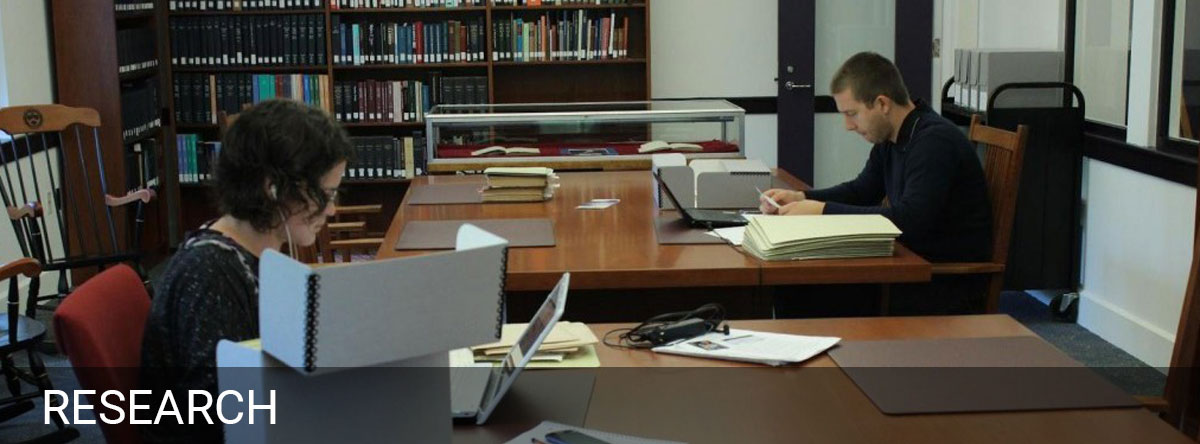 Viazovski, Yaroslav. Karl Barth’s Doubts about John Calvin’s Assurance: A Study of Two Doctrines of Assurance (Saarbrücken, Germany: VDM Verlag, Dr. Müller Aktiengesellchaft & Co. KG, 2009), 90 pp. $74.00 (paperback).
Viazovski, Yaroslav. Karl Barth’s Doubts about John Calvin’s Assurance: A Study of Two Doctrines of Assurance (Saarbrücken, Germany: VDM Verlag, Dr. Müller Aktiengesellchaft & Co. KG, 2009), 90 pp. $74.00 (paperback).
Reviewed by Melanie Webb (December 08, 2010)
Yaroslav Viazovski is a Reformed Baptist minister in Minsk, Belarus and is currently a doctoral student at Highland Theological College. Karl Barth’s Doubts about John Calvin’s Assurance was originally written as a thesis in completion of his Master of Arts degree from Reformed Theological Seminary, and has since been prepared for publication. Viazovski seeks to address a lacuna in the Russian Baptist literature. On his analysis, the defining issue between Russian Orthodoxy and evangelicals is the approach each takes to the doctrine of the assurance of salvation (9). He addresses this issue from a pastoral perspective, drawing on two major figures of the Reformed tradition, John Calvin and Karl Barth. The work is divided into two sections, the first on Calvin and the second on Barth.
Viazovski provides a compelling claim regarding Calvin at the outset of the first section: “For Calvin, assurance, which is inseparable from faith, is present in the true believer from the very beginning of his spiritual life and never leaves him in spite of the reality of doubts, fear, and anxiety” (16). He seems to have a difficult time similarly explicating the motivation for his extended engagement with Barth. It seems that his goal is to demonstrate that Barth’s doubts about Calvin’s assurance are dismissible. Consequently, upholding Calvin’s doctrine as developed in the Institutes is most salutary for pastors and their parishioners. In his analysis of both theologians, Viazovski seeks to examine their doctrines of assurance in the full context of their respective theologies.
In his first section, Viazovski notes that Calvin defines faith as assurance and identifies faith as a kind of knowledge (17). Assurance can be lacking when one doubts God’s veracity and when one misunderstands God’s mercy (18). While Viazovski categorizes the problem as primarily noetic, its solution is pneumatological. Assurance only comes from the word of God through which the Spirit works. Certainty in faith, then, requires certainty regarding Scripture. Viazovski finds in Calvin a view of Scripture as the trumping source of theology, taking precedence over tradition, reason, worship, and experience.
Perseverance is lived assurance; “the sealing of the Spirit is nothing else but the gift of perseverance in faith” (23). The subjective experience of faith is a complement to the objective particularity of God’s election of human persons in Christ. Everyone God loves, he loves in Christ such that “faith is not general knowledge about God but is sure and firm knowledge of God’s mercy given to us in Christ” (24). Christ serves as an intermediary mirror between God and humanity; when God looks at humanity, he sees Christ and when we look at Christ, we see our election. Election is the result of the primitive decree of God and serves as a present guarantee of our future salvation. As an objective fact, it must be subjectively internalized by each Christian (30).
But doubt, fear, and anxiety disrupt one’s experience of faith as assurance. Viazovski attributes Calvin’s treatment of such disruption to his pastoral insight into experiential reality (34). Any resistance to or struggle with doubt confirms assurance, which is preserved rather than attained. As a pastor, Viazovski responds warmly to Calvin’s continued inclusion of experiential reality in his theology. He provides a diagram to demonstrate that faith-assurance is at the center of the psychological portrait of the believer while doubts, fears, and anxieties coexist with hope and peace without undermining them or their source (41).
According to Viazovski, Barth believes that a Christological revision of Calvin’s doctrine of assurance is necessary. While Calvin links assurance to faith, Barth links assurance to election. Barth appropriates Calvin’s doctrine of double predestination by identifying Jesus Christ as the object of both election and rejection (50-51; 65). Viazovski refers to Barth’s position as a purified Supralapsarianism that identifies election as “the primal decision of God which determines that there will be a history between God and man and determines everything about this history” (58). While for Calvin the content of the primitive decree is a mystery, for Barth Jesus Christ is its content and the mystery lies in the fact of God’s involvement with humanity at all. In this way, the gospel itself is summed up in election (44). Rather than having Christ as a mediating mirror between God and humanity, Barth posits Christ as both agent and subject of election, i.e. Jesus Christ is the electing God and the elected man. The two natures of Christ become the two subjects of election. Assurance, then, is founded directly upon the election of Jesus Christ rather than one’s faith in him.
Just as Viazovski sought to hold in tension the coexistence of doubt and hope in Calvin’s theology, so here he seeks to hold in tension the co-witness by Christ and the believer to the believer’s election. The believer appropriates her election by faith (67). Before critically engaging with Barth’s position, Viazovski seeks to set his understanding of assurance as a corollary of election in the larger theological context of Barth’s theology. He turns to secondary literature to do so, admitting it is the lesser of two evils—either not addressing Barth in a larger context or doing so through secondary literature (43). Following Berkouwer, Viazovski treats Barth’s theology as framed by the triumph of grace (68), and challenging Barth’s concept of the “ontological impossibility of sin” because “it contradicts biblical language” (70).
While Viazovski highlights areas of particular importance to Eastern Christianity throughout the thesis, his conclusion focuses on the general pastoral import of each theologian rather than suggesting a way forward for the particular theological discussion he identifies in his introduction. After noting areas of admirable overlap between them, Viazovski ultimately concludes that Calvin’s doctrine of assurance is more pastoral than Barth’s because Calvin bases his doctrine on “the sound exegesis of the Bible” while Barth’s “exegesis is so innovative that it destroys the biblical witness” (87). The conclusion is suddenly placid towards Calvin and antagonistic towards Barth. One might infer that he sees the future of Russian Baptist theology benefiting immensely from Calvin while Barth poses the threat of an unbiblical theological trajectory. The inference is that Barth’s doubts regarding Calvin’s grounding of assurance in faith rather than election are based on unbiblical concerns.
Viazovski wrestles through Barth’s theology of election and its subsidiary doctrine of assurance through engagement with Church Dogmatics II/2, but he rejects Barth’s position because of topics that are treated elsewhere, such as the role of Scripture in the life of the church. For Barth, Scripture serves as an aspect of the apostolicity of the Church:
Like the apostles, [the Bible] does not will to rule but to serve. And it is where it is allowed to serve that it really rules; that it is not betrayed to any human control. It is not a prescript for either doctrine or for life. It is a witness, and as such it demands attention, respect and obedience—the obedience of the heart, the free and only genuine obedience. What it wants from the Church, what it impels the Church towards—and it is the Holy Spirit moving in it who does this—is agreement with the direction in which it looks itself. And the direction in which it looks is to the living Jesus Christ (IV/1, §62.2, p. 723).
Given that the witness of Scripture is Viazovski’s central criteria for reliable theology, it is puzzling that in the course of his thesis Viazovski does not wrestle with the extensive theological exegesis of either Calvin or Barth, nor does he provide his own reading of any passage of Scripture that might be germane to a discussion of assurance. If anything, Barth provides a more extensive engagement with Scripture in his Church Dogmatics than does Calvin in his Institutes. One must turn to Calvin’s commentaries and sermons for his read of Scripture, something Viazovski does on rare occasion (20, 25-6, 31).
Additionally, while Viazovski recommends embracing Calvin’s doctrine as Calvin himself explicated it (not as Beza or certain Puritans later represented him), he rejects Barth based on secondary representations of Barth’s doctrines of sin, faith, reconciliation, and eternal life. Further still, he does not reject Barth’s doctrine of assurance outright but instead rejects the entire basis of Barth’s whole theology: “However interesting, fascinating, creative and thought-provoking Barth doctrine may be it cannot become part of Christian theology because the biblical foundation is lacking” [sic] (87). While Viazovski’s reasons for rejecting Barth may be valid, he does not provide sufficient support for them in his thesis. Viazovski’s conclusions make it even more puzzling that he never gives a rationale for his engagement with Barth.
Nonetheless, in his engagement with CD II/2 Viazovski strives to present Barth in as favorable a light as possible. Even on a topic as controversial as universal salvation, he parallels the inconsistencies in Barth with inconsistencies in the Calvinistic doctrine of limited atonement, noting that “the deliberate inconsistency of Barth’s doctrine of election is not without parallel in the history of theology, even orthodox theology” (63). As a pastor committed to traditional Reformed theology, Viazovski provides an uncharacteristically refreshing and careful reading of Barth’s doctrine of election and assurance. He leaves the reader wishing for a more careful or measured critique of Barth’s overall theology, though.
The work includes a selective bibliography of works cited and employs diagrams at key places. The reader is sometimes slowed down, however, by misspellings and the misuse of articles, plurals, and possessives. While Viazovski often quotes extensively from both primary and secondary sources, his own voice remains clear in his synthesis of multiple insights. Although written with pastoral intent, Viazovski’s book will be most accessible to those formally trained in Reformed theology. It is a good resource for all students who are researching and engaging the doctrine of assurance in John Calvin and provides a sympathetic though ultimately dissenting perspective on Karl Barth’s doctrine of election and assurance. Despite a reductionist critique of Barth, Viazovski makes a valuable contribution to traditional Reformed theology by recognizing points of convergence and divergence in Calvin and Barth, and breaks ground for further work on a doctrine of assurance that can address this lacuna in Russian Baptist theology.
The views expressed here are strictly those of the author; they do not necessarily represent the views of the Center for Barth Studies or Princeton Theological Seminary.

